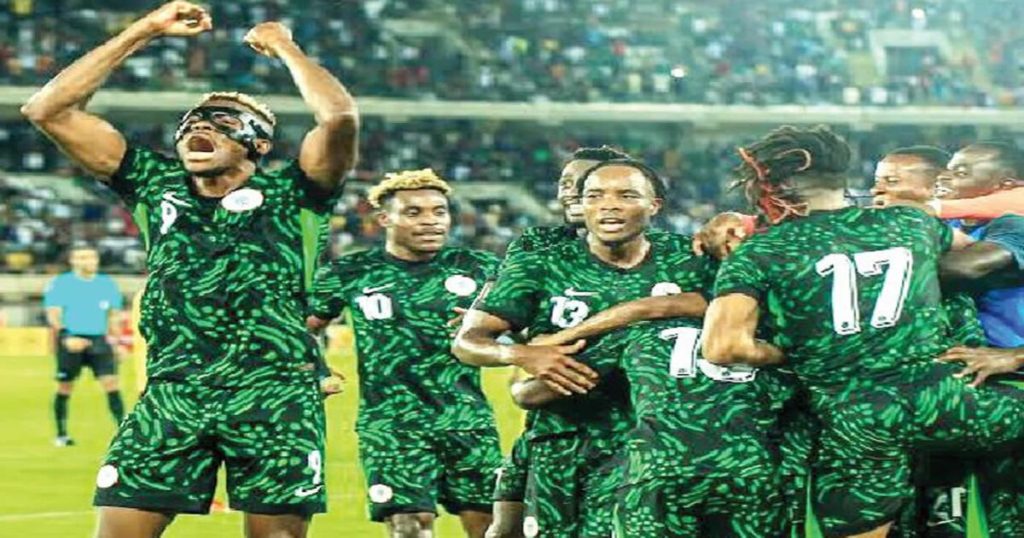Nigeria’s quest for a spot in the 2026 FIFA World Cup hangs in the balance, teetering between hope and uncertainty. The Confederation of African Football (CAF) has implemented a new qualification format that intensifies the pressure on competing nations. Under this system, only the group winners are guaranteed a direct ticket to the global football spectacle. The nine group winners from across the continent directly qualify, while the four best runners-up are relegated to a CAF playoff system. The winner of this playoff then faces another hurdle, an inter-confederation playoff, for a final chance to secure a coveted World Cup berth. This intricate qualification pathway necessitates a near-flawless performance from Nigeria in their remaining fixtures.
Nigeria is currently navigating a challenging Group C landscape. South Africa holds a commanding lead with 16 points and a superior goal difference of +8. Benin occupies the second spot with 11 points, while Nigeria trails in third place with 10 points and a +2 goal difference. The Super Eagles have three crucial matches remaining: an away game against South Africa, followed by another away fixture against Lesotho, and culminating in a decisive home clash against Benin. These matches represent Nigeria’s final opportunity to salvage their World Cup aspirations and avoid the precarious playoff route.
The most straightforward path to qualification for Nigeria is to win all three remaining matches, accumulating a total of 19 points. This scenario, however, hinges on South Africa faltering in their remaining two games, earning no more than two points to stay within reach of Nigeria’s potential 19-point tally. A victory against Benin in the final group match is paramount, as it would prevent Benin from surpassing Nigeria in the standings. Any dropped points by Nigeria would complicate matters significantly, requiring not only a complete collapse from South Africa but also favorable tiebreaker outcomes.
Should Nigeria fail to secure the top spot in Group C, the path to qualification becomes considerably more arduous. Securing second place becomes the primary objective, making the clash with Benin a virtual knockout fixture. Even with second place, qualification is not guaranteed. Nigeria would need to amass enough points, likely between 16 and 18, to rank among the four best runners-up across all CAF groups. This achievement would grant them entry into the CAF playoff, a single-elimination tournament where only the victor proceeds to the inter-confederation playoff. Winning both playoffs would be essential to secure a spot in the 2026 World Cup.
Adding another layer of complexity to this already precarious situation is the potential for a significant shift in Group C standings due to an eligibility issue involving South Africa. Midfielder Teboho Mokoena, who had accumulated two yellow cards and should have been suspended, reportedly played in South Africa’s win over Lesotho. According to FIFA’s Disciplinary Code, fielding an ineligible player can result in a 3-0 forfeit loss and a three-point deduction. Lesotho has officially lodged a complaint with FIFA regarding this matter, and reports indicate Nigeria is preparing to do the same.
The uncertainty surrounding FIFA’s decision on this matter casts a long shadow over Group C. A points deduction for South Africa would drastically alter the qualification dynamics, potentially benefiting Nigeria considerably. However, relying on this potential outcome would be unwise until a formal decision is announced by FIFA. Nigeria must focus on controlling the factors within their grasp, namely winning their remaining matches, while remaining aware of the potential ramifications of the ongoing investigation.
In conclusion, Nigeria’s World Cup dream remains alive, although the path forward is fraught with challenges and uncertainties. Securing a direct qualification spot requires a perfect run of victories in their remaining three fixtures, coupled with South Africa stumbling in their final two games. Failure to achieve this will thrust Nigeria into the precarious playoff system, demanding victories in the CAF playoff and the subsequent inter-confederation playoff. The looming possibility of a FIFA sanction against South Africa introduces an additional layer of complexity, potentially reshaping the group dynamics and influencing Nigeria’s qualification prospects. Ultimately, Nigeria’s destiny hinges on their own performances, combined with a degree of fortune and the outcome of FIFA’s pending decision.














